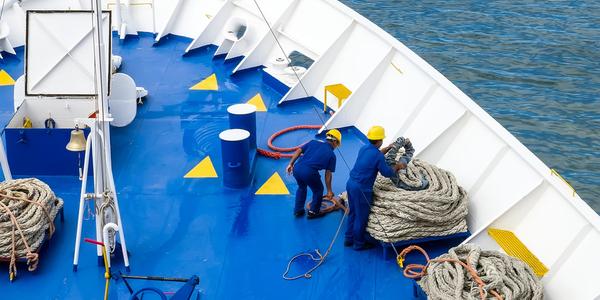Crew welfare is a key issue; it concerns people onboard. Without crew, ships would not sail and the world would stop; It is known that shipping is responsible for transporting more than 90% of our goods and energy. Crew is the backbone of shipping; therefore, we need to make sure that crew welfare is on top of mind to all of us, experts of the Industry Panel during the 2021 Crew Welfare Week agreed.
The continuing inability of ship operators to conduct crew changes due to COVID-19 pandemic affects seafarers’ welfare in many aspects. In this context, industry stakeholders have raised their voice in order seafarers to be acknowledged as key workers and progress on prioritizing the COVID-19 vaccination of seafarers.
Moderated by Carleen Lyden Walker, Co-Founder/Executive Director of NAMEPA and IMO Goodwill Maritime Ambassador, a diverse and interesting panel discussed about crew welfare challenges for industry stakeholders. Participants of this panel were: Sara Baade, CEO, Sailors’ Society; Gerardo A. Borromeo, VP & CEO, PTC Holdings Corporation; Jillian Carson-Jackson, President, The Nautical Institute; Martin Dorsman, Secretary General, European Community Shipowners Association (ECSA); David Hammond, CEO, Human Rights at Sea; Tom Jenkins, Deputy Director, Investigations Department, The Bahamas Maritime Authority; Paul Markides, Marine-Quality Manager, Intercargo and; Capt. M. Segar, Assistant Chief Executive (Operations), MPA Singapore.
Sailors’ Society is a global maritime welfare charity, offering ‘Wellness at Sea’ coaching programme which empowers seafarers to look after their own well-being, featuring related application. Mrs. Sara Baade explained that they are concerned with those seafarers at sea who are exposed to fatigue, but also with those ashore who cannot join ships and have increased anxiety and uncertainty.
At Sailors Society, we continue our work, trying to visit as many ships as we can, delivering also wellness programs to ensure that seafarer have mental and practical support they need to prevent their anxiety and concerns
…she said.
“The challenge goes back on how we had planned our business continuity for all activities; no one could ever predict such a global breakdown that disrupted the trade”, said Gerardo A. Borromeo and suggested that the pandemic taught us that we need to consider thinking beyond our resources, including also the inter relation among countries in case of emergency.
“We had a domino effect in which everyone had losses; but we are thankful that even in such circumstances, our seafarers continued to move the world. Albeit the challenges, shipping continued operations but we need to get prepared better for a future emergency. Global challenges need to be more effectively considered and addressed”, he stressed.
Continuing, Mrs. Jillian Carson-Jackson noted that the ongoing lockdowns and the inability to travel and connect have been among the key challenges. The Nautical Institute is the global body for maritime professionals; back in 2016, one of the first to focus on mental health; in collaboration with HRAS, The NI issued report for managing and improving seafarer mental welfare with focus on post-traumatic stress disorder (PTSD). “At NI, we try to provide support with resources in the members’ area, running webinars, networking. We also promote the good news, there are so much effort that is happening to support seafarers; there are organizations that do the extra mile”, she said.
At a European level, the pandemic showed that we need to harmonize policy measures
…highlighted Mr. Martin Dorsman, Sec-Gen of ECSA which is continuously raising its voice to resolve the crew change crisis soonest possible; along with ETF (European Transport federation, representing Seafarers), they fight for seafarers’ vaccination, visas and introduction of a visa waiver etc.
In turn, Tom Jenkins who is also the head of a recent BMA welfare survey to address the mental health needs of seafarers due to the pandemic, referred that repatriation remains a key challenge. “From our perspective, we try to assess the actual crisis with reliable support; we need to consider all challenges of the pre, the during and the post pandemic crisis, to identify what needs to change for the future, what we can implement, what recommendations we could enforce to address mental health and ensure that in the future, everything will be effectively adjusted in favor of our seafarers’ mental health and wellbeing”, he said.
Since the pandemic, for the first time the words human rights and humanitarian crisis were heard in the maritime industry, so there is a blessing in disguise
..noticed David Hammond.
Recently HRAS focused on Seafarers’ Abandonment; they brought many cases in the spotlight and issued a practical and legal guidance, advising seafarers on how to respond in such cases and where to get help. “A key thing is uncertainty for the crew members themselves and also for their families”, Mr. Paul Markides also noted. “It is important to consider how we keep the staff motivated as well as how to keep operations albeit the uncertainty”, he added.
Furthermore, Capt. Sigar referred to Singapore’s best practices.
We are happy that many initiatives are coming onboard. We continue vaccination and we work with companies on prioritizing vaccination for seafarers. Also, we work with other industry partners to establish crew change practices.
…he said.
MPA Singapore has issued crew change guidebook (and updated versions), which focuses on the various stages of crew change operations and is a member of the Singapore Crew Change Workgroup (SGCCWG) that coordinates efforts in Singapore for Crew Change.
All experts agreed that although mental health is being on the radar for a long time ago, the pandemic raised awareness towards this issue. In that regard, industry needs to focus on lessons learned and set priorities in order to focus on seafarers’ needs and continue to support their welfare.
Explore more herebelow


































































